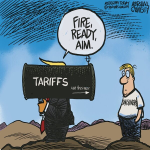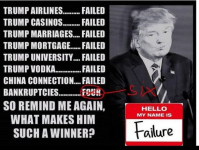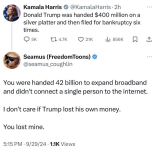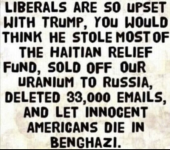signalmankenneth
Verified User
Donald Trump has claimed that Kamala Harris’s economic plan would result in an economic depression on the scale of the Great Depression of 1929. However, a major element of his own economic plan is the imposition of high tariffs on imports, which would be much more likely to lead to a depression than anything Harris is proposing. And there’s historical proof of that.
The stock market crash of October 1929 is generally accepted as the event that began the Great Depression. However, the market had partially rebounded in the first half of 1930, before President Herbert Hoover signed into law the Smoot-Hawley tariff act in June of that year. That act increased tariffs by 20 percent on a wide range of industrial and agricultural products. It was a terribly misguided effort at protecting U.S. producers and reversing the depression. But its effect was to deepen and lengthen it and to spread it globally. From 1929 to 1933, global trade declined from $3 trillion to less than $1 trillion.
Here’s how the Smoot-Hawley tariffs backfired:
Trump’s tariffs would have the same or greater impact and would repeat Herbert Hoover’s tragic mistake at great cost to America’s industries, workers, farmers and ranchers.
Three other points are worth making.
First, Trump seems to believe that tariffs simply level the playing field with our trading partners and that those nations should have no right to retaliate. But virtually all existing U.S. tariffs are set at levels negotiated with other nations in a series of reciprocal trade agreements beginning after World War II. As a result of those deals, the U.S. gained commitments from other nations to reduce tariffs on American goods. Any increase in U.S. tariffs, therefore, would abrogate those agreements and open the door to commensurate tariff increases on U.S. goods. This would devastate many sectors of the U.S. economy that depend heavily on exports.
Moreover, Trump’s latest proposed tariff of 200 percent on John Deere machinery imported from Mexico would contravene the trade agreement he himself negotiated with Mexico and Canada in 2018 and it would allow Mexico to apply equivalent tariffs on an equal value of U.S. goods. America’s farmers well know that Mexico is the second largest foreign market for their products.
https://www.yahoo.com/finance/news/opinion-donald-trump-tariff-plan-180000260.html


The stock market crash of October 1929 is generally accepted as the event that began the Great Depression. However, the market had partially rebounded in the first half of 1930, before President Herbert Hoover signed into law the Smoot-Hawley tariff act in June of that year. That act increased tariffs by 20 percent on a wide range of industrial and agricultural products. It was a terribly misguided effort at protecting U.S. producers and reversing the depression. But its effect was to deepen and lengthen it and to spread it globally. From 1929 to 1933, global trade declined from $3 trillion to less than $1 trillion.
Here’s how the Smoot-Hawley tariffs backfired:
- By increasing the cost of living. Since tariffs are a tax imposed on American importers (not foreign exporters), they increased the cost of imported products to consumers.
- By hurting U.S. exports. Other countries responded to the tariffs by raising their own tariffs, which severely harmed U.S. manufacturers and farmers.
- By causing additional bank failures. The impact of tariffs on the economy contributed to more bank failures, especially in agricultural areas.
- By reducing domestic consumption. People were forced to reduce consumption of goods, both imported and domestically produced. This led to American manufacturers and farmers selling less at lower prices.
Trump’s tariffs would have the same or greater impact and would repeat Herbert Hoover’s tragic mistake at great cost to America’s industries, workers, farmers and ranchers.
Three other points are worth making.
First, Trump seems to believe that tariffs simply level the playing field with our trading partners and that those nations should have no right to retaliate. But virtually all existing U.S. tariffs are set at levels negotiated with other nations in a series of reciprocal trade agreements beginning after World War II. As a result of those deals, the U.S. gained commitments from other nations to reduce tariffs on American goods. Any increase in U.S. tariffs, therefore, would abrogate those agreements and open the door to commensurate tariff increases on U.S. goods. This would devastate many sectors of the U.S. economy that depend heavily on exports.
Moreover, Trump’s latest proposed tariff of 200 percent on John Deere machinery imported from Mexico would contravene the trade agreement he himself negotiated with Mexico and Canada in 2018 and it would allow Mexico to apply equivalent tariffs on an equal value of U.S. goods. America’s farmers well know that Mexico is the second largest foreign market for their products.
https://www.yahoo.com/finance/news/opinion-donald-trump-tariff-plan-180000260.html




